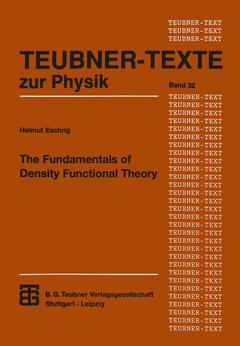The Fundamentals of Density Functional Theory, Softcover reprint of the original 1st ed. 1996 Teubner Texte zur Physik Series, Vol. 32
Langue : Anglais
Auteur : ESCHRIG Helmut

Density functional methods form the basis of a diversified and very active area of present days computational atomic, molecular, solid state and even nuclear physics. A large number of computational physicists use these meth ods merely as a recipe, not reflecting too much upon their logical basis. One also observes, despite of their tremendeous success, a certain reservation in their acceptance on the part of the more theoretically oriented researchers in the above mentioned fields. On the other hand, in the seventies (Thomas Fermi theory) and in the eighties (Hohenberg-Kohn theory), density func tional concepts became subjects of mathematical physics. In 1994 a number of activities took place to celebrate the thirtieth an niversary of Hohenberg-Kohn-Sham theory. I took this an occassion to give lectures on density functional theory to senior students and postgraduates in the winter term of 1994, particularly focusing on the logical basis of the the ory. Preparing these lectures, the impression grew that, although there is a wealth of monographs and reviews in the literature devoted to density func tional theory, the focus is nearly always placed upon extending the practical applications of the theory and on the development of improved approxima tions. The logical foundadion of the theory is found somewhat scattered in the existing literature, and is not always satisfactorily presented. This situation led to the idea to prepare a printed version of the lecture notes, which resulted in the present text.
I: Non-Relativistic Theory.- 1 Many-Body Systems.- 2 Density Matrices and Density Operators.- 3 Thomas-Fermi Theory.- 4 Hohenberg-Kohn Theory.- 5 Legendre Transformation.- 6 Density Functional Theory by Lieb.- 7 Approximative Variants.- II: Relativistic Theory.- 8 A Brief Introduction to Quantum Electrodynamics.- 9 Current Density Functional Theory.
Ouvrage de 204 p.
© 2024 LAVOISIER S.A.S.



